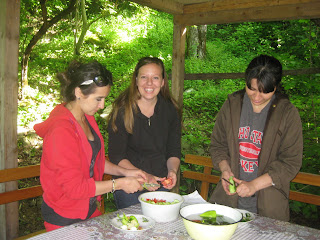Traditions….Traditions….
Living in Azerbaijan often reminds me of the musical "Fiddler
on the Roof"; the role and importance of
traditions are likewise very evident here, even among those of the younger
generation for whom breaking with tradition might seem, on the one hand, desirable,
but on the other, risky for maintaining family ties.
And so it is that I have become aware of a common dilemma facing
some young Azerbaijanis: they fall in
love!! However, for some of these young
people the decisions about their futures do not lie solely in their own
hands. I know several young couples who
now must separate, because their parents have found different, more "suitable,"
mates for them—they cannot decide for themselves whom they should marry, it is
decided by the parents. Lucky is the
young couple when the parents agree that the one they have chosen to love is
also a suitable and agreeable choice for a marriage partner by the respective parents. An engagement in fact is only really official
when the respective parents meet, discuss, and decide that they will approve and allow an
engagement to take place. In this
society going against your parents’ wishes, and certainly your parents’
decisions, could bring about a permanent rift—a disowning—and with that a
forever tarnished reputation. Of high
value in Azerbaijan is the respect children, including adult children, show to
their parents, and parents are likewise expected to make all important
decisions for their adult children.
Unlike American families, where often parents begin training their
children at an early age to make their own choices and eventually move out on
their own, Azerbaijani children often follow the advice and decisions of their
parents well into adulthood. By
tradition, a young married couple may even live in the home of the groom’s
parents, so that the mother-in-law can show the new bride how to do things
properly. Some may not like this lack of
freedom and lack of personal choice, but by tradition many Azerbaijanis do
follow these societal norms. For some
modern-thinking Azerbaijanis these traditional ways can unfortunately lead to
broken hearts; but alas, acceptance of tradition, even reluctant acceptance, is
an important Azerbaijani value. Moreover, unlike in America, where we might
thumb our noses at what others think, here in Azerbaijan people are imbued with
the notion that what others think of you—your reputation—is so very important,
that one rarely risks the scoffing and scandal of breaking with tradition and
going against the wishes of one’s parents. However, Azerbaijan is also a country in transition, so the importance of some long-held traditions is weakening--at least for some Azerbaijanis.
It is not only in these arranged marriages where families
decide what is best for an individual family member. When I was making arrangements to move to my
own apartment, the mother in my host family understood that it would be more
convenient for me to live closer to my work; but she did not like the idea of
me living on my own. She told me, that
if her house were closer to my work, she would ‘forbid’ me from moving to my own
apartment, and that if I didn’t ‘obey’ she would call my daughter Christina in
California and tell her to insist that I not move out on my own! When I told Christina about this, she laughed,
“Like as if I could have such influence and tell you what to do, Mom,
eh?” I replied, well here in Azerbaijan
adult children do take care of and make decisions for their parents, but
likewise, parents have final say over many important decisions in the lives of
their adult children, too. The American notion, “I’ll trust you to do what you feel is best,” is not the traditional
family value espoused to here.
Lately, I have conducted sessions on American values and
assumptions, based on writings from Gary Althen of the University of Iowa. It is just as eye-opening for me as an
American to realize why we Americans view things in certain ways—why for us
individualism, independence, and freedom are so highly valued. It is equally important and interesting to
catch a glimpse of why, for much of the rest of the world, such typical
American values carry less weight and less importance. Whereas Americans believe in a can-do
attitude and a desire to instill change, many others in the world take a fatalistic
and complacent view of life—what will be, will be.
Last
week, we had a wonderful outing organized by a youth organization here in
Mingachevir; now that the university semester is over, a crowded bus-ride full
of young people into the mountains was in order, though at first it seemed it
may not happen when the promised bus-driver slept in and didn’t show up; but
after an hour of searching, a new bus driver was found. Once we got started, we knew we were in for quite a ride...the mini-bus was over-packed and some of the guys sat in the aisle on the floor or on little crates, even a small park-bench was brought into the bus, but alas, some guys still had to stand the whole trip. After an hour over rural mountain roads, we
settled into a picnic shelter, barbequed kebabs of lamb and chicken as well as
potatoes, onions, peppers and tomatoes.
It was great. Also, there was an
invigorating (very steep) hike to the ruins of an old fortress castle and a
rousing game of mafia. The whole day was
funny and fun!
Over-crowded mini-bus
Will our bus fit under the road barrier?
Road to our destination
Picnic prep
Samovar tea
Kebab sandwich...tis good
Medieval fortress...now in ruins
Scaling the ramparts of the ruins
The mighty Caucasus with view to Russia
Skewered kababs for barbequing



































